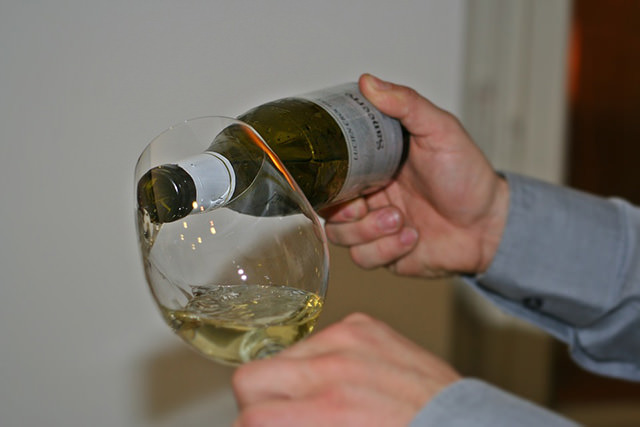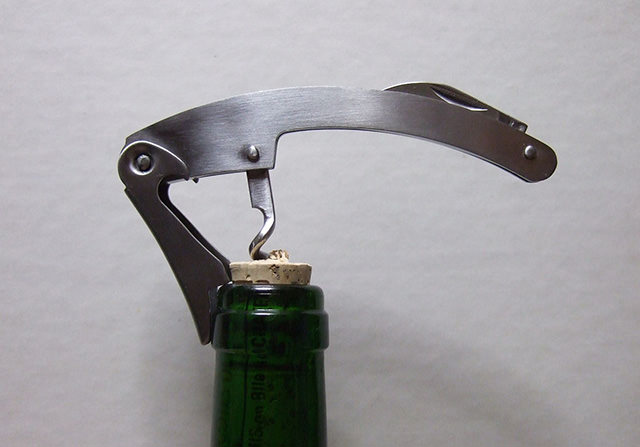Sommelier school seems popular these days. But how do you become one?
It’s quite simple. The only thing you need to do is call yourself a sommelier. A lot of restaurant sommeliers don’t hold certificates and many places won’t require anything but experience.
In the right environment and/or under the right supervision you can learn a lot about wine and how to serve it without ever going to school. Next to that, these days you can probably learn the trade entirely through the Internet.
 Yet if you do have a true passion for wine and want to become a professional, taking a course and getting certified is probably the best and most surefire way. It is, however, far from easy and requires a lot more time memorizing textbooks than most people think. But don’t take our word for it. We’ve interviewed fellow lifestyle writer, communication expert and bon vivant Anita Zaror who has been training to become a sommelier.
Yet if you do have a true passion for wine and want to become a professional, taking a course and getting certified is probably the best and most surefire way. It is, however, far from easy and requires a lot more time memorizing textbooks than most people think. But don’t take our word for it. We’ve interviewed fellow lifestyle writer, communication expert and bon vivant Anita Zaror who has been training to become a sommelier.
Why are you studying to become a sommelier?
My journey into sommellerie could be compared with the natural progression from a young, vibrant Sauvignon Blanc, to a complex, tannic red blend. My interest in wine started when I was studying journalism at university, and I took an extracurricular course in oenology – back then I could only tell whether I liked a wine or not, but I couldn’t tell why. With time I started reading more about wine, I attended several tastings, and visited vineyards in different countries, becoming more and more fascinated with the topic. In 2012 I decided to take level 1 at the Chilean School of Sommeliers, only to fulfill the enjoyment of what had become one of my hobbies. In the next two years, and due to my work as a lifestyle journalist and PR consultant, I had to undertake projects that required some knowledge about wine; so last year I decided to take level 2. My hobby suddenly became a real passion, and now I find myself taking level 3 (and final), to become a professional sommelier. I’m a big fan of multisensory experiences, and learning to taste drinks and food through our six-sense basis (including the mind) is definitely one of them. I go to school with a smile on my face every time, so that’s why I’m studying sommellerie: because it makes me happy.
What school or institution are you studying at and how difficult is the course?
I am currently studying at two different schools:
- The Chilean School of Sommeliers, a member of the Association de la Sommellerie Internationale (ASI): this course consists of three levels that can be done in a minimum of two years, and it includes theoretical and practical examinations, dozens of tastings, visits to vineyards, written reports, and a thesis; emphasis is on service and Chilean wines, but we also learn about wines and spirits of the world; I’m currently taking level 3.
- I am also taking the WSET (Wine & Spirit Education Trust) Level 2 Award Wines and Spirits, at The Wine School, Chile: this is a shorter course that doesn’t focus so much on service, but on in-depth knowledge about wines and spirits of the world.
Both courses become more difficult and detailed with each level.
Is it harder or easier than you expected?
Definitely harder! Watch the documentary “Somm” on Netflix, or the final of the “Best Sommelier of the World 2016” competition on YouTube – these are self-explanatory.
What proved to be the biggest challenge in becoming a sommelier/completing the course?
Attending classes is the best part – it’s so much fun! It’s the final examinations, which are challenging:
- Theoretical exams:you have to know everything from grape varieties, history, and world production zones, to technical tasting aspects, reading labels, and production methods for products such as wine, water, beer, spirits, cheese, coffee, tea, spices, habanos, and olive oil.
- Practical exams:
- Blind tasting:you will have three glasses in front of you and limited amount of time to guess what’s inside (type of drink, main ingredient, production region, vintage, etc.) and to give an organoleptic description of each one of them, together with pairing suggestions (for example, an aged Chardonnay with grilled salmon and a creamy sauce, or a sweet rum with dark chocolate)
- Service:you should decant and serve a wine to a jury, according to international sommelier standards
Wine
How much of the course is theoretical and how much is practical and what do your classes look like?
I’d say it’s 50-50. At sommelier school we may have a three-hour class about vinification or wine chemistry, in which we will just take notes and discuss with the professors; or a three-hour tasting session where we may try 5–15 drinks; or a combination of both. Of course—unlike many people think—we do not swallow the alcohol, and it’s quite hard to start tasting say spirits at 9 a.m. – you should always have a very good breakfast before doing that!
Are you having fun with it?
I’m loving every single sip of it!
Thanks for talking to us Anita.



 0
0